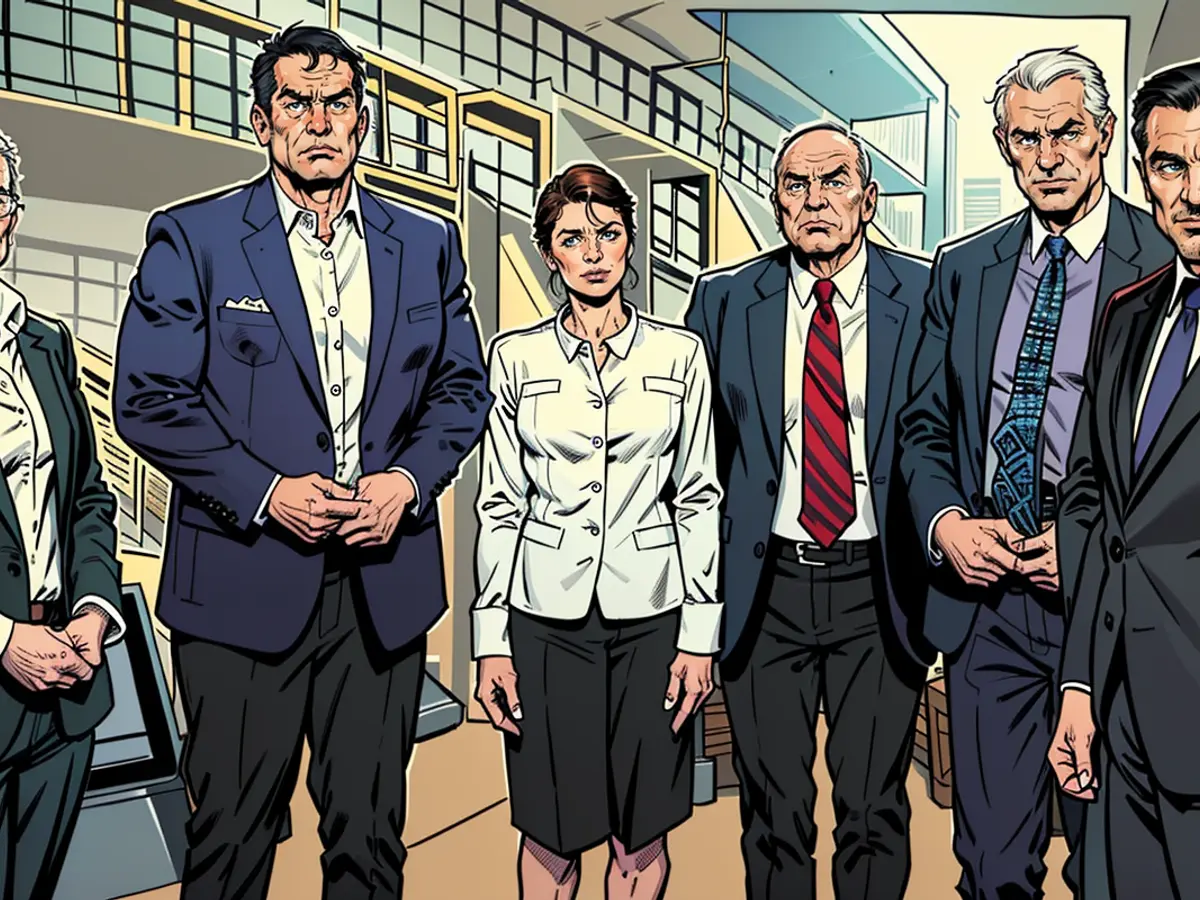CDU state leaders clash with Merz over potential alliances with BSW.
In the European election, the Union and the Left Party (BSW) emerged victorious. The CDU leader, Friedrich Merz, stated he wouldn't form a coalition with the Left Party, but some CDU state leaders wouldn't completely close this option. They prefer to keep it open.
There are contrasting opinions within the CDU regarding a possible alliance with the Left Party (BSW). While CDU leader Merz ruled out a partnership with the BSW, the Thuringian CDU keeps this route viable. Before the state election, the CDU won't preclude any scenario, revealed CDU leading candidate Mario Voigt on Welt TV.
Merz had expressed his stance on potential coalitions with the BSW and the AfD on Monday night in a public broadcasting outlet, stating, "We've consistently asserted — we collaborate with no such right-wing and left-wing parties." In the view of Sahra Wagenknecht, both classifications apply to her: "Wagenknecht is right-wing in some cases, and left-wing in others."
BSW leader Wagenknecht criticized Merz's unwillingness to form a partnership with the BSW. "Apparently, the CDU chairman desires to make the newly formed states ungovernable," she commented in an interview with "Spiegel". "Every East German voter must reflect on voting for the CDU, which supports further pension cuts and wishes to make Germany a combatant in Ukraine with the provision of Taurus missiles."
BSW General Secretary Christian Leye tossed back the allegation of extremism from Merz, calling it "ill-informed." Merz must "grasp the political realities in Eastern Germany," proposed Leye to "World." "Through responsibility, the CDU may be compelled to make a decision — their ideology or the basic principles of majority decisions."
Thuringia's CDU state and group leader Voigt suspected Merz spoke on behalf of the national level. Furthermore, Voigt highlighted that the Thuringian CDU didn't engross in coalition deliberations before the election. "Our objective is to be the most prominent influence in Thuringia to engender positive change," stated Voigt to "Tagesspiegel".
And if they attain this position, Voigt added, "we’ll see who we can solve the issues of the state with." The Thuringian CDU refuses to dismiss any tactics beforehand. Voigt unequivocally rejected a coalition with the AfD and the Left.
"I’ve had a sensible discussion with Katja Wolf, whom I've always regarded as a lively municipal politician," said Voigt to "Star". Former Left Party politician Wolf serves as the state leader and guiding candidate of the BSW in Thuringia. "I hear more decent ideas from her and the Thuringian BSW in migration and education policy," emphasized Voigt.
A new state parliamentary vote will transpire in Thuringia on September 1st. In the elections, the AfD has led in Thuringia for a while, followed by the CDU and the Left, led by Minister President Bodo Ramelow. The BSW has achieved 16 percent in the latest poll. A coalition of the Left Party, SPD, and Greens presides in Thuringia.
Hendrik Wüst, Minister President of North Rhine-Westphalia, affirmed that it's plain to the Union that "we're not partnering with extremists." Nonetheless, he recommended caution on proposing top-down solutions for local issues. "One has to be vigilant — what is the situation, and who are we actually dealing with?" he added.
Saxony's Minister President, Michael Kretschmer, echoed a similar standpoint. "The discourse and this intensely emotional approach have resulted in the popularity of populists in this election," he stated at a meeting with Wüst in Leipzig. The only solution now is "conversing with individuals about what they want and what they reject."
"The discussion of the approaching weeks, months, and years must focus on: What do you seek? What are you advocating for? Which party backs your cause?" solicited Kretschmer. Moreover, local councils aren't parliaments but components of administration. "The task is to conduct business accordingly," detailed Kretschmer. "A mayor or district administrator should interact with everyone within such a municipal council." Because not every AfD member is a right-wing extremist, and every AfD voter isn't either. The club's upper-echelon comprises "such individuals."
In the European elections, the AfD held the top slot in the east - except Berlin. Behind them, the CDU and the FDP followed. As the state polls in Thuringia, Saxony, and Brandenburg draw nearer, complicated coalition talks seem imminent under these terms.
Read also:
In the CDU, opinions on potentially allying with the Left Party (BSW) vary widely. Sahra Wagenknecht, leader of the BSW, criticized Friedrich Merz's stance against partnering with her party. Meanwhile, Thuringia's CDU leader, Mario Voigt, hasn't ruled out such an alliance before the state elections. Hendrik Wüst, the Minister President of North Rhine-Westphalia, has emphasized the importance of not partnering with extremists but urged caution in dealing with local issues. Similarly, Michael Kretschmer, the Minister President of Saxony, urged for constructive dialogue to understand the wants and needs of the voters, acknowledging that not every AfD member or voter is an extremist.








